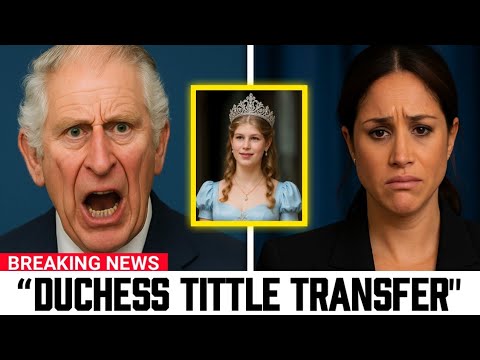In an unexpected and highly controversial development that has captivated royal watchers and stirred debates across the globe, reports are circulating that King Charles has made the unprecedented decision to remove Meghan Markle’s Duchess of Sussex title and confer it upon Lady Louise Windsor instead.
This surprising move, which has sent shockwaves through both royal circles and the wider public, appears to signal a significant recalibration of the monarchy’s future direction. For many, the timing raises numerous questions—why now, and what does this mean for Meghan’s role and influence within the royal sphere?
The announcement reportedly left Prince Harry in a state of disbelief. According to insiders, this was not just another royal reshuffle; it was a deeply personal and symbolic gesture that carried enormous weight. The act of stripping Meghan of her title and assigning it to Lady Louise was not merely administrative—it was a bold declaration about the values and priorities of the monarchy under King Charles’s leadership.
The public reaction was swift and divided. On one side, critics of the monarchy saw the move as a thinly veiled attempt to erase Meghan’s legacy, interpreting it as punishment for her and Harry’s decision to step back from royal duties and live independently in the United States.
To them, the title was more than a ceremonial label—it was a testament to Meghan’s historical role as a modern, barrier-breaking figure within a traditionally rigid institution. On the other hand, supporters of the royal family viewed the decision as a return to the values of tradition, decorum, and loyalty. To them, Lady Louise represented a quieter, more dutiful brand of royalty, one that better aligned with King Charles’s vision of a streamlined monarchy.
Lady Louise Windsor, daughter of Prince Edward and Sophie, Duchess of Edinburgh, has typically remained out of the spotlight. Reserved and modest, she has never actively sought public attention, yet her quiet dedication and grace have drawn praise in recent years. As speculation grew over King Charles’s long-term plans for the monarchy, Louise began appearing more regularly at official events, subtly stepping into a more visible role. The decision to elevate her with such a prestigious title may be both a reward for her commitment and a strategic effort to reinvigorate the monarchy with figures who embody discretion and tradition.
The context surrounding this decision is rooted in years of royal tension. Meghan Markle’s entrance into the royal family was hailed as a groundbreaking moment—an American actress of mixed heritage marrying into British royalty symbolized progress and modernization. However, the promise of a new era soon clashed with institutional rigidity and intense public scrutiny.
Media controversies, alleged family conflicts, and the couple’s decision to relocate to the U.S. fueled a widening rift. The infamous “Mexit” moment, when Harry and Meghan formally stepped down from their senior royal roles, marked the beginning of a new chapter—but also left unresolved tensions between the Sussexes and the rest of the royal family.
Even after their departure, Meghan continued to use the Duchess title in public endeavors, from media appearances to philanthropic work. This drew mixed reactions—some applauded her for maintaining a connection to her royal past, while others argued that it blurred the lines between royal duty and celebrity. The ongoing debate became a flashpoint in conversations about the monarchy’s role in modern society.
Now, with the reported transfer of the Duchess title to Lady Louise, King Charles seems to be making a definitive statement about the direction he wishes to steer the royal family.
Sources close to the palace suggest that the king deliberated extensively before making this move, weighing public sentiment, institutional image, and long-term legacy. His preference for a leaner, more focused monarchy may have influenced the decision, with an emphasis on rewarding those seen as loyal and compliant over those who have publicly distanced themselves from royal responsibilities.
For Prince Harry, the news reportedly felt like a betrayal. Though he had accepted the consequences of stepping back from royal life, this act seemed to cross a line. It wasn’t just about titles—it was about legacy, recognition, and perhaps a final severing of symbolic ties between Meghan and the institution that had once welcomed her. Insiders claim Harry was not given prior notice, heightening the emotional impact and adding to the perceived slight.
Meanwhile, Lady Louise finds herself unexpectedly in the center of public attention. A relatively private figure until now, she must now navigate the pressures and expectations that come with her new title. Her quiet demeanor and traditional upbringing are seen by some as a refreshing contrast to the media-heavy presence of Meghan and Harry. However, others question whether she is prepared for the scrutiny that comes with such a prominent role.
This development is not only a personal blow to Meghan and Harry but also a strategic maneuver that could reshape the monarchy’s future. By assigning the Duchess title to someone within the inner royal circle who embodies traditional values and avoids controversy, King Charles is reinforcing a vision of royalty that prioritizes continuity, duty, and decorum. The move also distances the institution from the more celebrity-driven narrative associated with Meghan, signaling a return to a more classic royal model.
As debates continue online and in the media, the decision’s implications grow clearer. It marks a decisive turning point in the post-Elizabethan era, highlighting the royal family’s struggle to balance modern relevance with historical identity. Whether this shift will strengthen or further divide the monarchy remains to be seen, but one thing is certain—the symbolic weight of titles, especially within the House of Windsor, carries power far beyond the surface. This move is more than a change in designation; it’s a statement about legacy, loyalty, and the future shape of the British royal family.
